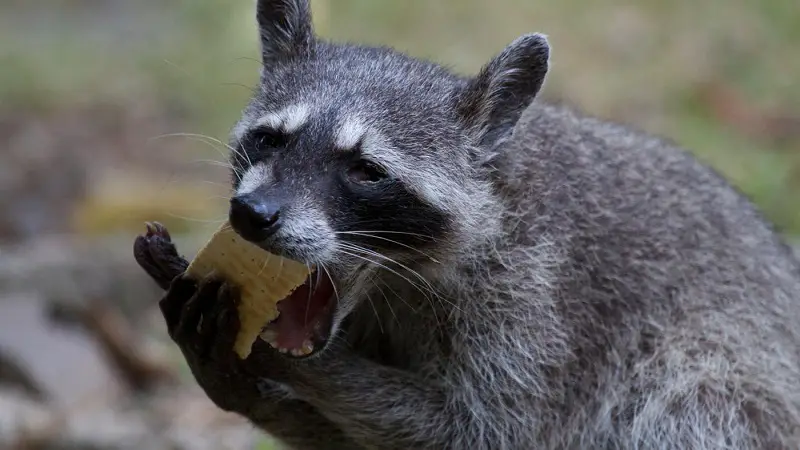This article isn’t intended to make you feel like Bill Murray’s character from Caddyshack but in order to catch a raccoon you need to be able to think like a raccoon…well, maybe not exactly.
You do, however, need to know what raccoons like to eat.
You also need to know how to safely and properly bait a raccoon trap as efficiently as possible.
The goal of this article is to provide you with that information, but you should keep in mind that unlicensed trapping and/or killing of wildlife is restricted or illegal in some areas so know your local regulations before proceeding.

What Do Raccoons Eat?
It would be easier to answer the question, “What do raccoons NOT eat?” because these critters have a reputation for many things, but being picky eaters isn’t one of them. Raccoons are omnivores (like most of us), meaning they eat plants as well as animals. Raccoons also have a notoriously sweet tooth and are obsessed with fatty, sugary products. Unlike (most) humans, however, they will do whatever it takes and go wherever they must to get their fill.
In the wild, raccoons feast on nuts, berries, fruits, and vegetables. They will also eat insects, eggs, small fish, and even small birds and mammals. In urban environments or when there isn’t much food to be found in nature raccoons become scavengers. They are known for opening and turning over trash cans, ripping into garbage bags, and stealing food meant for household pets.
How Do Raccoons Find Food?
In the wild, raccoons have an innate ability to pluck small fish and turtles from the water. These animals are surprisingly quick, and their claws allow them to dig into the dirt to find insects and bug larvae. Raccoons become familiar with the locations of fruit and nut trees. They compete with squirrels for what lands on the ground, but they also have the ability to scale trees for the fresher fare.
In areas where natural food sources or scarce, as well as in densely-populated and/or developing areas, raccoons have no choice but to come into contact with humans. Apart from the occasional rabid specimen, most raccoons are simply curious but can be easily scared off. If they catch a whiff of your garbage, however, then all bets are off. If raccoons can find a regular food source they will continue to use it. Your garbage can needs to be sealed tightly. Even if the lid is secure raccoons are persistent and they will stop at nothing to get the lid off. Use a bungee cord to prevent raccoons from opening the lid, and put something heavy on top or and/or around the can to keep it from tipping.
What are Raccoons’ Favorite Foods?
It’s abundantly clear by now that raccoons will eat just about anything. Teenagers are often the same, and just as teenagers have specific preferences when making things magically disappear from the pantry, raccoons also like some treats more than others. Sugar is their Achilles Heel, so they can’t resist things like cookies, cake, and candy. They’ve even been known to drink leftover soda and beer directly out of the can or bottle. Additionally, raccoons love peanuts and peanut butter, and they also have an obsession with cat and dog food (wet or dry).
What is The Best Bait to Use for Raccoons?
Most experts using a combination of white bread and marshmallows to catch a raccoon in a trap. You can leave an inconspicuous trail of these items leading up and into the trap. Most of the bait should be placed near the back of the cage, and it should be secured in a can or something that prevents the raccoon from reaching in through the wires to take the bait. You should always wear gloves when handling bait or the trap itself. This will make it less likely for animals to have suspicions about the new object that contains a sweet treat.
Which Kinds of Raccoon Bate Should I NOT Use, and Why?
Don’t ever use poison when baiting a raccoon trap. Not only is this inhumane and unethical, but it could also be illegal depending on the area in which you live. You shouldn’t bait raccoon traps with items like dog food, chicken parts, meat gravy, or old leftovers containing meat. It might sound logical to use such items since they are known for attracting raccoons, but these specific types of bait could also attract domestic pets or other wild animals. Stick to the best raccoon baits mentioned above to avoid trapping and/or harming the wrong animal.
Conclusion
Clearly, raccoons’ palates are not very refined and they will eat pretty much whatever they can get their paws on.
By following the tips mentioned above you can use raccoons’ favorite foods against them to trap them while avoiding incidents with other animals. If you have any questions, comments, or suggestions regarding raccoons’ appetites and the best way to bait “nature’s bandits” then we’d love to hear from you in the Comments section below.
